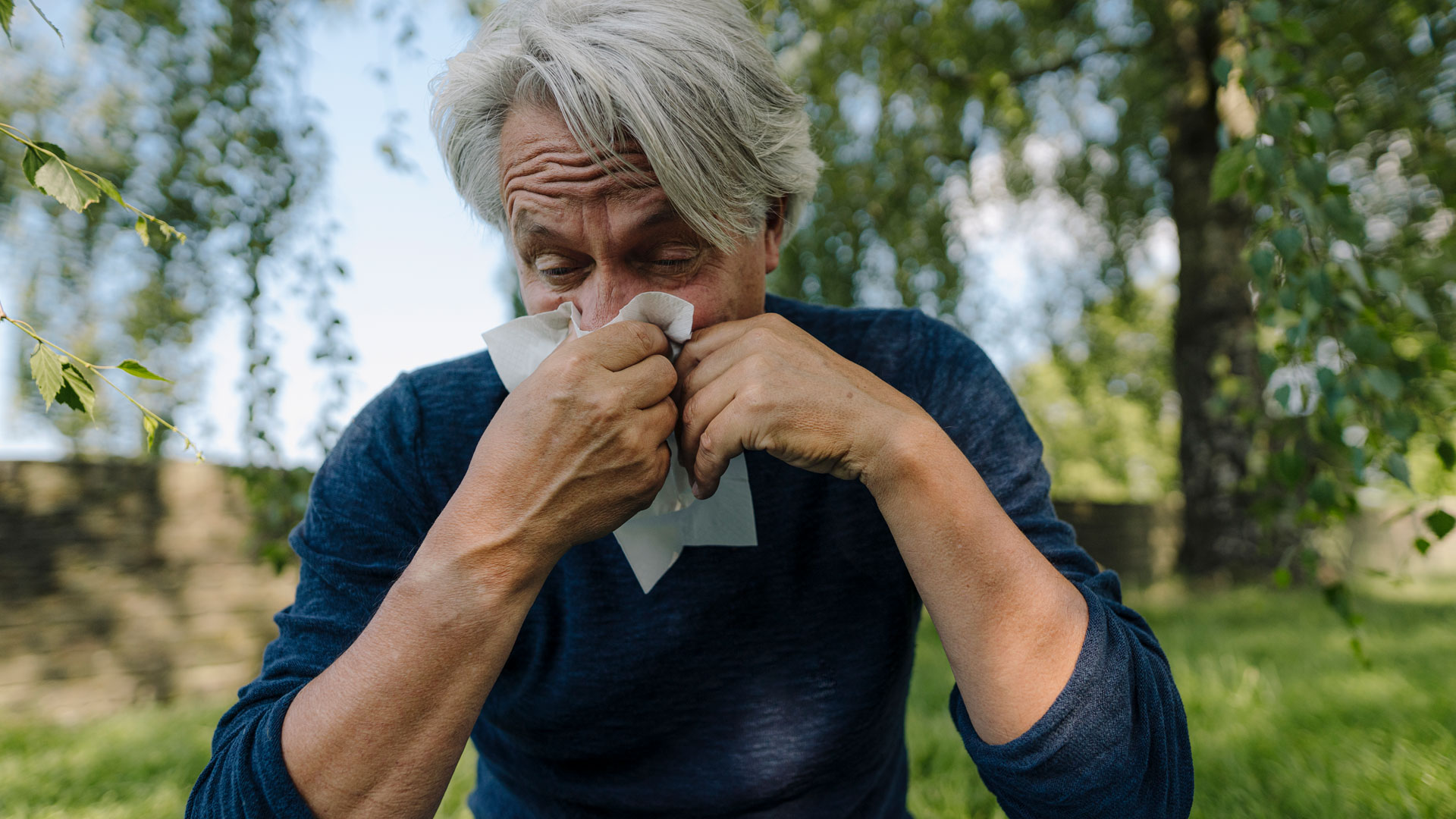What causes allergies?
Discover what causes allergies and how you can ease symptoms at home.

Get the world’s most fascinating discoveries delivered straight to your inbox.
You are now subscribed
Your newsletter sign-up was successful
Want to add more newsletters?

Delivered Daily
Daily Newsletter
Sign up for the latest discoveries, groundbreaking research and fascinating breakthroughs that impact you and the wider world direct to your inbox.

Once a week
Life's Little Mysteries
Feed your curiosity with an exclusive mystery every week, solved with science and delivered direct to your inbox before it's seen anywhere else.

Once a week
How It Works
Sign up to our free science & technology newsletter for your weekly fix of fascinating articles, quick quizzes, amazing images, and more

Delivered daily
Space.com Newsletter
Breaking space news, the latest updates on rocket launches, skywatching events and more!

Once a month
Watch This Space
Sign up to our monthly entertainment newsletter to keep up with all our coverage of the latest sci-fi and space movies, tv shows, games and books.

Once a week
Night Sky This Week
Discover this week's must-see night sky events, moon phases, and stunning astrophotos. Sign up for our skywatching newsletter and explore the universe with us!
Join the club
Get full access to premium articles, exclusive features and a growing list of member rewards.
Wondering what causes allergies and if there's a cure? Well, allergies are exaggerated immune reactions to foreign substances. They can cause many physical symptoms that depend on the degree of immune response and the mode of entry into the body.
The global prevalence of allergies is rising and about 30-40% of the world's population may have a specific allergy, according to the patient advocacy group, the Global Allergy & Airways Patient Platform. Allergies can affect all age groups and may be triggered in response to common things such as foods, drugs, plant or animal products.
People with allergies may develop a skin rash, swelling and congestion of the upper airway when exposed to pollen or dust. In this article, you'll learn the causes of allergies and how you can manage them at home, including measures such as using the best air purifiers and decreasing exposure to the thing you're allergic to.
How do allergies start?
According to Medical News Today, allergies are caused by allergens, which are foreign substances that are not usually harmful except in people with the genetic predisposition to mount an exaggerated immune response.
Allergens stimulate the immune system to produce a specific slew of antibodies (proteins that bind specific substances). These antibodies in turn trigger the release of chemicals such as histamines from mast cells. The combination of these chemicals produces physical symptoms such as itching, swollen eyes, red eyes, etc. that allergy sufferers complain about. For instance, the most common food allergies are mediated by IgE antibodies, according to a study published in 2016 in the journal Nature Reviews Immunology.
The type of allergen and the mode of entry into the body determine the physical external manifestation of allergies. For instance, exposure to skin allergens results in itchy skin rash, swelling and a burning sensation in the skin, while pollen allergens can cause a runny nose, chest tightness and difficulty breathing.
Here are some common allergens, according to Healthline:
Get the world’s most fascinating discoveries delivered straight to your inbox.
- Food: Peanuts, eggs and shellfish
- Drugs: Penicillins, sulfur-containing drugs
- Stings from insects like bees, wasps
- Plant products such as pollen from grasses and trees
- Animal materials such as pet dander
A person may be hypersensitive to one or more of these allergens which may result in anaphylaxis — a life-threatening allergic reaction due to excessive immune system response to a specific allergen.
Anaphylaxis is characterized by low blood pressure, difficulty breathing and severe skin reactions, according to the Mayo Clinic. It is a medical emergency and requires prompt hospital treatment.

Can allergies be cured?
There is no cure for allergies, children can outgrow some food allergies that they develop in early childhood, according to a 2014 survey conducted by the Immunology and Allergy Clinics of North America. The study showed that children who were initially allergic to milk in early childhood became milk-tolerant later. Some children also outgrow early childhood allergies to foods like eggs.
Allergies can be managed using multiple methods, but one of the most effective ways, as revealed by a study in the journal Adolescent Medicine, is to identify your allergens and avoid exposing yourself to them.
Here are some tips to decrease exposure to home allergens, according to Healthline:
- Install dehumidifiers to reduce damp surfaces at home.
- Replace rugs with ceramic tiles for floors.
- Decrease exposure to pets.
- Install HEPA filters to remove airborne allergens.
Medications such as antihistamines are effective against itching, runny nose and skin swelling, according to the Mayo Clinic.
Individuals who are severely allergic to airborne allergens may need allergy shots. These allergy shots contain a weak form of an allergen injected into the body to train the immune system to mount an immunologic response when exposed to the allergen later.
For instance, in people with pollen allergies, a small concentration of a pollen allergen is injected into the body to train the immune system to create antibodies against that substance. During subsequent exposure to pollen, these already-made antibodies eliminate pollen before the rest of the immune system can be activated. A review study on the efficacy of allergy immunotherapy for control of asthma conducted at the University of Edinburgh, showed allergy shots are capable of reducing asthmatic symptoms but there were associated adverse reactions. Therefore, the risk and benefit are considered before an allergy immunotherapy is administered – preferably by a specialist.

Can allergies cause a sore throat?
Allergies cause a sore throat when airborne allergens stimulate the immune cells in the nose. This leads to an immune response that results in the production of thick mucus and secretions in the nasal cavity. This results in post-nasal drip, or an itchy or irritating feeling associated with throat pain as the thick mucus flows down from the back of the nasal cavity into the throat. Postnasal drip may also come with nasal itching, congestion, eye swelling, sneezing or coughing.
Allergies vs COVID-19: What's the difference?
Allergies and COVID-19 may share common features and symptoms such as a cough and nasal congestion, but there are some subtle differences between them. However, if you do have symptoms consistent with allergies, it is critical to be tested for COVID-19, as many of the symptoms overlap, and you may unwittingly spread the deadly coronavirus if you assume your symptoms are caused by allergies.
The following factors differentiate allergies from COVID-19, according to the Mayo Clinic:
Causative agent: COVID-19 is caused by the SARS-COV-2 virus. Infectious organisms do not cause allergies.
Mode of transmission: COVID-19 is transmitted when an infected person releases infectious respiratory droplets when, sneezing, coughing, talking or breathing, according to the Centers for Disease Control and Prevention (CDC). In contrast, allergies are not contagious and the respiratory droplets from an allergic person do not contain any infectious organism.
Clinical Symptoms: According to the CDC, COVID-19 triggers symptoms like fever, shortness of breath, muscle aches, and loss of smell and taste, which are typically absent in allergies. Note: anaphylaxis can cause difficulty breathing. By contrast, allergy symptoms such as persistent itching and watery eyes are not associated with COVID-19.
Treatment: While allergies are treated using medications and prevention measures like avoiding allergy triggers, the single best way to prevent COVID-19 is to get vaccinated against the disease.
What causes allergies: The round-up
Allergies are caused by allergens, and they can be found in some foods, airborne particles, drugs, animal dander, etc.
Allergy symptoms are easy to manage with medications and preventive measures to avoid allergens. Seek a doctor's counsel and clinical evaluation if you are prone to allergies.
Dr. Christopher Oseh is an experienced primary care physician, health blogger, content marketing professional, and self-published author. He specializes in creating content for health care providers and health technology companies. He has been featured on Harvard Medical school blog and has also created content for a variety of health technology clients.
 Live Science Plus
Live Science Plus











